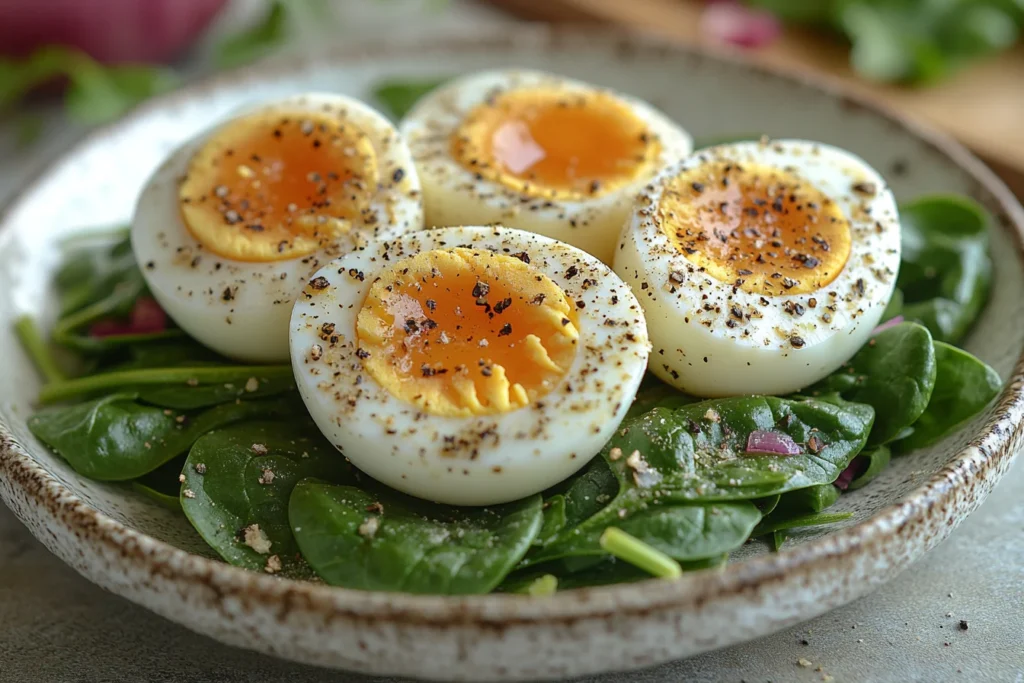Can We Eat Spinach and Boiled Eggs Together? An Introduction
Can we eat spinach and boiled eggs together? Absolutely! This combo might not sound flashy, but trust me, they’re a match made in food heaven. Whether you’re looking for a quick breakfast, a hearty salad topper, or a light dinner option, this duo has you covered. It’s easy to whip up, incredibly nutritious, and surprisingly versatile like, who knew something so basic could feel so fancy? If you’re curious about how to prepare it, check out our Spinach with Boiled Eggs Recipe for a simple and delicious idea.
Here’s the thing: spinach is one of those superfoods that makes you feel like you’ve got your life together. It’s packed with vitamins, minerals, and fiber, while boiled eggs bring the protein and that creamy texture we all love. Together, they make a dish that’s as good for your taste buds as it is for your body. For more details on their health benefits, visit Are Boiled Eggs and Spinach Good for You? and see why this combo is a top pick for any meal.
In this post, I’ll break down why this duo works so well, share some tips to keep your spinach fresh and your eggs perfectly cooked, and throw in a few ideas to make your meals pop. Let’s get cracking (pun totally intended).

Table of Contents
Digestive Considerations
Spinach and boiled eggs are a nutrient-rich duo, but like any food combo, they can have digestive implications you’ll want to keep in mind. Don’t worry, though most of these are manageable with a little planning.
The Fiber Factor in Spinach
Spinach is a high-fiber vegetable, which is great for your gut health in the long term. Fiber helps regulate digestion, keeps you regular, and supports a healthy microbiome. However, if you’re not used to eating a lot of fiber, too much spinach too quickly can lead to bloating or gas. To ease into it, start with smaller portions and gradually increase the amount you eat over time.
Also, spinach contains oxalates, natural compounds that can bind to calcium and sometimes lead to kidney stones in susceptible people. If you have a history of stones, you might want to balance spinach with other calcium-rich foods that are lower in oxalates or consult a healthcare provider for guidance.
The Role of Eggs in Digestion
Boiled eggs are an excellent source of protein, which is easy to digest for most people. That said, some individuals may find eggs cause mild digestive discomfort, particularly if they have an egg intolerance or sensitivity. Symptoms might include bloating, gas, or stomach cramps. If you suspect this, try limiting egg intake or discussing it with your doctor.
For many people, the way eggs are cooked can also make a difference. Hard-boiled eggs, for example, are more firm and may be harder to digest than soft-boiled ones. If you notice discomfort, consider adjusting the cooking method.
Combining Spinach and Eggs
The pairing of spinach and boiled eggs is generally gentle on the stomach. Spinach provides bulk and fiber, helping the body process the protein from the eggs efficiently. However, if you’re prone to acid reflux, large portions of spinach might exacerbate symptoms due to its slight acidity. Balancing it with a starchy food like whole-grain bread or quinoa can help neutralize this effect.
A Few Digestive Tips
Hydrate: Fiber from spinach needs water to move smoothly through your system. Drink plenty of fluids throughout the day.
Cook Spinach Lightly: Cooking spinach reduces its oxalate content and makes it easier to digest, especially if raw spinach upsets your stomach.
Portion Mindfully: Stick to moderate servings to avoid overloading your digestive system.
Nutritional Synergy
Spinach and boiled eggs aren’t just delicious they’re a nutritional powerhouse when paired. Each ingredient brings its own set of benefits, and when combined, they complement each other beautifully to give your body a balanced boost.
A Protein and Fiber Dream Team
Let’s start with the basics. Spinach is a leafy green rich in fiber, which helps support digestion, keeps you full, and stabilizes blood sugar levels. Boiled eggs, on the other hand, are packed with high-quality protein that aids in muscle repair and maintenance. When you eat these two together, you’re pairing fiber and protein—a duo known to promote satiety and keep hunger at bay. This combination makes it a perfect meal for weight management or an energy-packed start to your day.
Vitamins and Minerals Galore
Spinach is a nutrient-dense food, loaded with vitamins like A, C, and K, as well as minerals like iron, magnesium, and potassium. Boiled eggs come in strong with vitamin D (one of the few natural food sources!), B vitamins, and essential minerals like selenium and choline.
Here’s where the synergy comes in: the fat in eggs helps your body absorb the fat-soluble vitamins in spinach, such as vitamins A and K. That means by eating these two together, you’re getting the most out of the nutrients in both foods.
Boosting Iron Absorption
Iron is an essential mineral found in spinach, but it’s in a form (non-heme iron) that’s harder for the body to absorb. Enter eggs, specifically the yolk, which contains heme iron and a healthy dose of vitamin C-like compounds. These can help improve your body’s ability to absorb the non-heme iron from spinach, making this pairing especially beneficial for those at risk of iron deficiency.
Antioxidants Meet Healthy Fats
Spinach is brimming with antioxidants like lutein and zeaxanthin, which support eye health and fight oxidative stress. Eggs contain healthy fats that act as carriers for these antioxidants, enhancing their absorption and making their benefits more accessible to your body.
Balanced Energy and Blood Sugar
Together, spinach and boiled eggs provide a meal that’s low on the glycemic index, meaning it won’t cause sharp blood sugar spikes. The combination of protein, healthy fats, and fiber ensures steady energy throughout the day.

Common Myths and Misconceptions
Spinach and boiled eggs are often hailed as nutritional superstars, but with all the praise, there’s also a fair share of myths and misconceptions surrounding them. Let’s break down some of the most common ones and get to the truth.
Myth 1: Spinach Is the Best Source of Iron
Remember the old Popeye cartoons that made spinach famous for its iron content? While spinach does contain iron, it’s not the richest source, nor is it the easiest for your body to absorb. Spinach contains non-heme iron, which isn’t absorbed as efficiently as the heme iron found in animal products like eggs. Plus, the oxalates in spinach can bind to iron, making it even less available to the body. Pairing spinach with vitamin C-rich foods or heme iron sources (like eggs) can boost absorption, but it’s not a magic bullet for iron deficiency.
Myth 2: Eating Eggs Raises Cholesterol
This one has been around for decades, but it’s largely been debunked. While eggs do contain cholesterol, research shows that dietary cholesterol has a minimal impact on blood cholesterol levels for most people. In fact, the fats in eggs, especially the yolk, are packed with nutrients like choline and healthy fatty acids that support brain and heart health. Unless you have a specific condition that requires cholesterol management, enjoying a boiled egg or two a day is perfectly fine.
Myth 3: Raw Spinach Is Always Better
Many people believe raw spinach is the healthiest way to eat it, but that’s not entirely true. While raw spinach is rich in nutrients, cooking it can actually make some nutrients, like vitamin A and iron, more bioavailable by reducing the oxalate content. Lightly steaming or sautéing spinach can help you get the best of both worlds: a delicious, tender texture and easier absorption of key minerals.
Myth 4: Boiled Eggs Are Harder to Digest
Some folks claim boiled eggs are heavy on the stomach, but for most people, they’re one of the easiest protein sources to digest. Any discomfort might come from overcooking, which can make the yolk firm and slightly rubbery. Soft- or medium-boiled eggs are often gentler on digestion.
Myth 5: Spinach and Eggs Are Only for Breakfast
While spinach and eggs are a breakfast staple, they’re incredibly versatile. Think lunch salads, hearty dinner bowls, or even snacks like spinach and egg wraps. They’re perfect any time of day!
Understanding these misconceptions helps you make better choices while appreciating just how amazing spinach and boiled eggs really are.
FAQs About Spinach and Boiled Eggs: Can We Eat Them Together?
Are spinach and boiled eggs good for weight loss?
Absolutely! Spinach is low in calories and high in fiber, helping you feel full without adding extra calories. Boiled eggs provide high-quality protein that supports muscle maintenance and keeps hunger at bay. Together, they make a nutrient-packed meal that’s satisfying and great for weight management.
How should I store fresh spinach to keep it from wilting?
To keep spinach fresh, wrap it in a paper towel to absorb moisture and store it in a perforated plastic bag or container in the fridge. Avoid washing it until you’re ready to use it, as excess moisture can make it spoil faster.
How long do boiled eggs last in the fridge?
Boiled eggs can be stored in the fridge for up to one week. Keep them unpeeled and in an airtight container to maintain freshness and prevent them from absorbing odors from other foods.
Can I eat spinach and boiled eggs every day?
Yes, you can! Both are packed with nutrients and can be part of a balanced diet. However, variety is key to getting a broad range of nutrients, so try to pair them with other veggies, proteins, and grains throughout the week.
Is it better to eat spinach raw or cooked with boiled eggs?
Both options are great! Raw spinach retains more vitamin C, while cooked spinach offers better absorption of certain nutrients, like vitamin A and iron. A mix of raw and cooked spinach in your meals can give you the best of both worlds.
Are there any downsides to eating spinach and boiled eggs?
For most people, no. However, if you’re prone to kidney stones, you might want to limit spinach because of its oxalate content. Also, individuals with egg allergies or sensitivities should avoid eggs. Otherwise, they’re a safe and healthy combo for most diets.

Conclusion: Can We Eat Spinach and Boiled Eggs Together?
Spinach and boiled eggs are more than just a simple pairing they’re a nutritional powerhouse that fits seamlessly into any meal plan. Whether you’re looking for a quick breakfast, a light lunch, or a protein-packed snack, this combo delivers on flavor, health benefits, and versatility.
Packed with fiber, protein, vitamins, and minerals, spinach and boiled eggs work together to fuel your body, keep you full, and support overall wellness. Plus, they’re easy to prepare, affordable, and endlessly adaptable to different cuisines and dishes.
By busting common myths, understanding how they benefit digestion, and exploring creative ways to enjoy them, you’re set to make the most of this dynamic duo. So grab some fresh spinach, boil a few eggs, and get ready to enjoy a wholesome, satisfying meal that’s as good for your taste buds as it is for your health.
Sometimes, the simplest ingredients really are the best.

